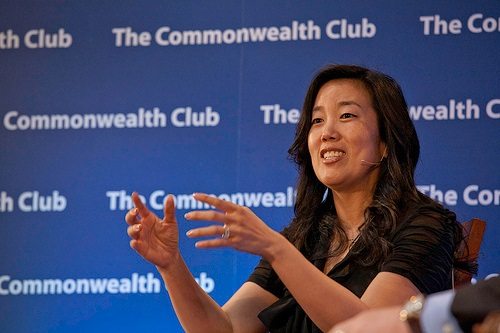
August 13, 2014; Politico
It is important for the nonprofit sector to acknowledge the departure of Michelle Rhee from the school privatization advocacy organization she founded, StudentsFirst. Her public written explanation cited personal reasons: “It’s…time for my next step in life, which will be focused on my family and supporting my husband [Sacramento Mayor Kevin Johnson],” Rhee wrote. “His focus and passion for underserved communities…will be central to whatever comes next for us.” That probably means that KJ, as he was known as a star NBA guard with the Phoenix Suns, has political aspirations higher than Sacramento, boosted by his recent role as the spokesperson for NBA players who were aghast at the continued ownership of the Los Angeles Clippers by Donald Sterling and, more recently, by his election as president of the U.S. Conference of Mayors.
Everyone wishes Rhee well with her focus on husband and family, but her departure from StudentsFirst does create an opening for analysis of what she accomplished at StudentsFirst and where and how she might have fallen short. Although a nominal Democrat, Rhee’s organization provided campaign support to candidates of both parties who favored privatization of elements of the public schools and the diminishment of teachers unions. Rhee drew a great deal of support from private contributors, including privatization-oriented hedge fund moguls such as Romney campaign bundler David Teppler and hedge fund manager Dan Loeb and Democratic foundation leaders such as John and Laura Arnold and Eli Broad (as well as much more conservative philanthropists such as the Walton Family Foundation). She put together a powerhouse board with the likes of Connie Chung, Bill Cosby, former NBA player Jalen Rose, former N.Y. Representative Rev. Floyd Flake, former CNN anchor Roland Martin, and Michael Bloomberg’s chancellor of the New York Department of Education Joel Klein (with Bloomberg himself as a funder of StudentsFirst).
Sign up for our free newsletters
Subscribe to NPQ's newsletters to have our top stories delivered directly to your inbox.
By signing up, you agree to our privacy policy and terms of use, and to receive messages from NPQ and our partners.
In this brief space, we don’t propose to do a complete retrospective of Rhee’s leadership of StudentsFirst, much less the broader elements of her career, but rather raise some issues that have emerged in the press coverage of her resignation that merit discussion.
- Fundraising for privatization education: Rhee’s original pledge was to raise a billion dollars for her education reform agenda. She fell well short, as she was undoubtedly going to, but even beyond that impossible goal, she was not as successful a fundraiser as some expected. She raised some big dollars for her version of education reform, but the fundraising had declined in recent years. Without her at the helm, does StudentsFirst have a future of being able to raise anything like the money Rhee raised? Politico notes that StudentsFirst has scaled back its operations in several states, closing five of 18 state offices, including Florida and Minnesota, which may or may not be related to the organization’s recent declining fundraising take.
- Building coalitions: Politico suggested that Rhee’s “imperious” style frustrated and defeated the ability of StudentsFirst to build effective coalitions. In particular, observers cited her tactical inflexibility, which those of us who experienced her in Washington, D.C. view as what did her in as the head of the public school system under former mayor Adrian Fenty. Politico cites examples that sound like StudentsFirst coming into states where other education reformers were already doing work and taking a stance that sounded like a “my way or highway” approach. Was the coalition weakness of StudentsFirst simply due to Rhee’s personality, or is there something more that undermines the ability of privatization advocates to effectively coalesce?
- Political leanings: StudentsFirst put big money into Republican candidates over the years and even honored Tennessee state representative John Ragan, a Republican, as “education reformer of the year” in 2013, notwithstanding Ragan’s other claim to fame as the author of the state’s proposed “don’t say gay” bill. Her appreciation of politicians favoring her school privatization positions meant that their support of other reprehensible policies, such as the anti-gay position of Ragan, could be ignored. Her stance taking on the teachers unions made her popular with generically anti-union Republicans, to be sure, but did Rhee’s position reveal an increasing move by Democrats into what has been the longtime Republican animosity to the American Federation of Teachers and the National Education Association? Might Rhee have been revealing that significant Democratic leaders, notably President Obama and Education Secretary Arne Duncan, are moving toward the anti-union school privatization movement despite their nominal liberal Democratic backgrounds?
Some of the press debate is on whether StudentsFirst can survive without Rhee as its president and CEO. However, reports suggest that Rhee will continue on the board of directors, and the organization is aiming toward hiring another high-profile person as CEO, such as former NBC-TV anchor Campbell Brown, who founded the Partnership for Educational Justice, which challenges teacher tenure laws, and the Parents’ Transparency Project.
Rhee may have less time to devote to StudentsFirst, since she has been elected chair of the board of St. Hope Public Schools, the 1,800-student charter school network established by Johnson. She has also joined the board of Scott’s Miracle-Gro. It may be interesting to note that Miracle-Gro’s company PAC contributed to the election campaigns of George W. Bush in 2004 and Rudolph Giuliani in 2008, though no presidential candidates in 2012, and overall, its contributions to House and Senate candidates over the years have leaned heavily Republican.
Because of slow sales, Miracle-Gro just announced staff layoffs; the number is unspecified, but the news coverage implies that the layoffs will not be inconsequential. Having controversially laid off teachers in D.C. and now closing StudentsFirst offices in five states, Rhee might have a lot to bring to the board of Miracle-Gro.—Rick Cohen











